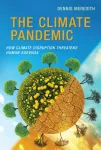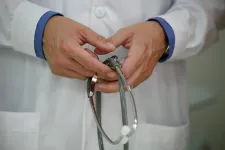(Press-News.org) Certain diseases, including Alzheimer’s, are currently considered “undruggable” because traditional small molecule drugs can’t interfere with the proteins responsible for the illnesses. But a new technique that specifically targets and breaks apart certain proteins — rather than just interfering with them — may offer a pathway toward treatment. Researchers reporting in ACS Central Science have, for the first time, designed a compound that targets and breaks down a posttranslationally modified protein closely associated with Alzheimer’s disease.
Researchers have been exploring targeted protein degradation (TPD) as a way to get at hard-to-treat proteins, namely, the ones for which inhibitors or other conventional techniques fail. Though these degraders have shown some initial promise, things can get complicated if the proteins go through “post-processing,” or posttranslational modifications, after being formed. Thus far, no TPD technique has been able to target this type of protein.
One protein that would be particularly advantageous to break down is p38, which is involved in several cellular signaling pathways and is linked to the development of Alzheimer’s disease. Although previous attempts to treat the disease by focusing on p38 have been made — including a drug candidate that went through two phases of clinical trials — they suffered from off-target effects and limited efficacy. But like many proteins, p38 goes through posttranslational modifications, including phosphorylation, to form p-p38. This adds a phosphate group to the protein, activating it and changing its shape. By homing in on this form instead, the treatment could be made more specific. So, Nam-Jung Kim, Kyung-Soo Inn, Jong Kil Lee and colleagues wanted, for the first time, to create a protein degrader that could target and break down p-p38, and potentially offer a new avenue for treating Alzheimer’s disease.
The team screened several compounds specific for p-p38, eventually finding PRZ-18002, which selectively induced degradation of p-p38 over both similar proteins and its inactivated form. In fact, PRZ-18002 maintained its selectivity even when tested against 96 different protein kinases similar to p38. When delivered to the brains of mouse models of Alzheimer’s disease, the compound downregulated the p38 pathway, improving cognitive abilities, including spatial reasoning, and disease-related brain chemistry, such as the accumulation of amyloid-beta plaques. The researchers say that this work could someday provide a novel treatment for Alzheimer’s disease and open up opportunities for future treatments of other diseases that also involve modified proteins.
The authors acknowledge funding from the National Research Foundation of the government of Korea (MSIT) and the Basic Research Laboratory Program and Medical Research Center Program of the National Research Foundation funded by the Korean Ministry of Science, ICT and Future.
The paper’s abstract will be available on Mar. 1 at 8 a.m. Eastern time here: http://pubs.acs.org/doi/abs/10.1021/acscentsci.2c01369
For more of the latest research news, register for our upcoming meeting, ACS Spring 2023. Journalists and public information officers are encouraged to apply for complimentary press registration by completing this form.
The American Chemical Society (ACS) is a nonprofit organization chartered by the U.S. Congress. ACS’ mission is to advance the broader chemistry enterprise and its practitioners for the benefit of Earth and all its people. The Society is a global leader in promoting excellence in science education and providing access to chemistry-related information and research through its multiple research solutions, peer-reviewed journals, scientific conferences, eBooks and weekly news periodical Chemical & Engineering News. ACS journals are among the most cited, most trusted and most read within the scientific literature; however, ACS itself does not conduct chemical research. As a leader in scientific information solutions, its CAS division partners with global innovators to accelerate breakthroughs by curating, connecting and analyzing the world’s scientific knowledge. ACS’ main offices are in Washington, D.C., and Columbus, Ohio.
To automatically receive news releases from the American Chemical Society, contact newsroom@acs.org.
Follow us: Twitter | Facebook | LinkedIn | Instagram
END
Degrading modified proteins could treat Alzheimer’s, other ‘undruggable’ diseases
2023-03-01
ELSE PRESS RELEASES FROM THIS DATE:
Toilet paper is an unexpected source of PFAS in wastewater, study says
2023-03-01
Wastewater can provide clues about a community’s infectious disease status, and even its prescription and illicit drug use. But looking at sewage also provides information on persistent and potentially harmful compounds, such as per- and polyfluoroalkyl substances (PFAS), that get released into the environment. Now, researchers in ACS’ Environmental Science & Technology Letters report an unexpected source of these substances in wastewater systems — toilet paper.
PFAS have been detected in many personal care products, such as cosmetics and cleansers, that people use every day and then wash down ...
Glacier National Park could provide climate haven for Canada Lynx
2023-03-01
PULLMAN, Wash – Glacier National Park is home to around 50 Canada lynx, more than expected, surprising scientists who recently conducted the first parkwide occupancy survey for the North American cat.
The Washington State University-led survey reveals the iconic predator resides across most of Glacier’s 1,600 square-mile landscape, although at lower densities than in the core of its range further north.
“The population in the park is still substantial and exceeded our expectations,” said Dan Thornton, WSU wildlife ecologist ...
Fraunhofer USA awarded patent for detecting air leakage in buildings using communicating thermostats
2023-03-01
The United States Patent and Trademark Office has awarded Fraunhofer USA with a patent for algorithms that detect and quantify air leakage from single-family homes using data from commercially available communicating, thermostats.
Outdoor air can infiltrate homes through many pathways, including windows and doors, poorly sealed connections between exterior walls and basements and attics, and unsealed wall, floor, and ceiling penetrations in occupied spaces. Prior field studies have found that most homes have appreciable air leakage, which accounts for approximately a quarter of space conditioning energy consumption. Not only can air leakage significantly increase home energy consumption, ...
New book warns of human extinction from climate change
2023-03-01
A new book, The Climate Pandemic: How Climate Disruption Threatens Human Survival, concludes that humans will not survive the unrelenting onslaught of climate disruption. The e-book is available free on Amazon March 1-5.
“As horrific as the COVID-19 pandemic has been, its effects pale in comparison to the coming catastrophe from climate disruption,” wrote author and veteran science writer Dennis Meredith. “In fact, the climate pandemic will steadily worsen, even bringing our species to extinction, unless we launch a global revolution to abandon our carbon-dependent energy system.
“Given the evidence in this book, I see only a vanishingly small possibility of ...
Book tackles myths about science of menstruation
2023-03-01
CHAMPAIGN, Ill. — A new book from University of Illinois Urbana-Champaign anthropology professor Kathryn Clancy takes an unflinching look at the many ways humans have struggled – and often failed – to understand one of the greatest mysteries of human biology: menstruation.
In “Period: The Real Story of Menstruation,” Clancy first focuses on the myriad ways human societies, their leaders, scientists and health practitioners have gotten it wrong – from myths and taboos about the purpose and health effects ...
Researchers uncover how gene that increases risk of genetic heart disease works, paving way for new treatments
2023-03-01
Researchers have discovered how a gene that increases the risk of developing genetic heart disease functions, paving the way for new treatments.
The study, led by Murdoch Children’s Research Institute and published in Nature Cardiovascular Research, has revealed a new pathway for how children and adults develop cardiomyopathy, a group of diseases that affect the heart’s ability to pump blood around the body.
Heart disease is the leading cause of death worldwide. Patients with cardiomyopathy, a form of heart disease ...
Will you let a robot assist in surgery on you? The role of advertising in high-tech medical procedures
2023-03-01
Researchers from Korea Advanced Institute of Science and Technology and University of Texas at Dallas published a new Journal of Marketing article that examines whether direct-to-consumer advertising for robotics surgery is effective at swaying patients to choose it over other types of procedures.
The study, forthcoming in the Journal of Marketing, is titled “The Role of Advertising in High-Tech Medical Procedures: Evidence from Robotic Surgeries” and is authored by Tae Jung Yoon and TI Tongil Kim.
Robotic surgery and the ethics ...
Taking vitamin D could help prevent dementia, study finds
2023-03-01
Taking vitamin D supplements may help ward off dementia, according to a new, large-scale study.
Researchers at the University of Calgary’s Hotchkiss Brain Institute in Canada and the University of Exeter in the UK explored the relationship between vitamin D supplementation and dementia in more than 12,388 participants of the US National Alzheimer's Coordinating Center, who had a mean age of 71 and were dementia-free when they signed up. Of the group, 37 per cent (4,637) took vitamin D supplements.
In the study, ...
Checklist Prompters Support ICU Rounds
2023-03-01
Rounding checklists can help hospital care teams improve patient outcomes, and new research points to the potential for patient-specific checklists as a valid way to effectively translate the latest evidence into clinical practice.
These checklists can be helpful tools during daily rounds when multidisciplinary members of the patient care team convene to discuss each patient’s status and care plan. If too complex or generic, the checklists may instead become a burden, taking up valuable time with minimal impact.
One way to customize rounding checklists is to have an individual serve as a checklist prompter, listening to the conversation, eliminating ...
Home-based cardiac rehabilitation may help people live longer
2023-03-01
Research Highlights:
In a study of U.S. military veterans, researchers noted that participating in home-based cardiac rehabilitation was associated with a 36% lower risk of death compared to veterans who chose not to participate in cardiac rehabilitation.
Less than half of the study participants enrolled in rehabilitation, which focused on improving heart-healthy behaviors.
The research may be the first U.S. study to provide evidence of living longer with home-based cardiac rehabilitation in people with heart disease.
Embargoed until 4 a.m. CT/5 a.m. ET Wednesday, March 1, 2023
DALLAS, ...



